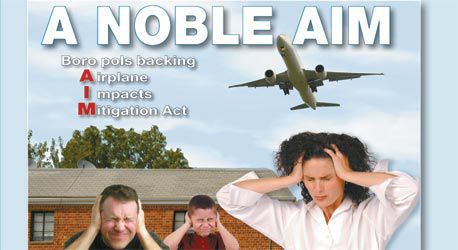From the Queens Chronicle:
Total Republican control of Washington hasn’t discouraged some Queens lawmakers from pushing a bill to make information about the health effects of airplane noise and emissions available to the Federal Aviation Administration.

The GOP’s tight grip on the federal government hasn’t prevented some Queens representatives from co-sponsoring a House of Representatives bill called the Airplane Impacts Mitigation Act. The bill would require the Federal Aviation Administration to partner with an independent public health school to do a study of airplane noise health effects to improve decision-making by the agency.
The Airplane Impacts Mitigation Act, which was introduced by Rep. Stephen Lynch (D-Mass.), is co-sponsored by Reps. Joe Crowley (D-Bronx, Queens), Grace Meng (D-Flushing), Tom Suozzi (D-Suffolk, Nassau, Queens) and Hakeem Jeffries (D-Brooklyn, Queens), along with other U.S. lawmakers who are in Congress’ Quiet Skies Caucus.
Airplane noise has become an even bigger concern for many Queens residents thanks to the GPS-based NextGen navigation system, which can save fuel and time for flights by sending them over extremely precise and narrow routes. Although it can increase efficiency, Lynch’s office said, the neighborhoods below the flight paths are burdened with menacing noise and negative health effects.
The AIM Act would require the FAA administrator to make an agreement with a “reputable and independent school of public health” to do a study of the health impacts of airplane noise exposure such as elevated blood pressure, sleep disturbance, asthma exacerbation and stress.
The health impacts of exposure to large amounts of airplane noise can be serious. A study by Harvard and Boston University public health researchers found that people who live in ZIP codes that experience a large amount of airplane noise are at an increased risk for cardiovascular problems.
The AIM Act study would focus on residents living below flight paths in several cities, including New York.
Even the FAA, whose bureaucracy is a main target for quiet skies advocates, appears aware of the flight system’s noxious effects.
“Using NextGen procedures also sometimes results in changes in flight patterns and noise for communities around airports,” FAA Administrator Michael Huerta said in September. “As a result, we’ve seen an increasing level of public debate, political interest, and even litigation related to aircraft noise.”
Queens Quiet Skies President Janet McEneaney hopes that the AIM Act, if passed, results in a more exact metric for measuring NextGen noise than day-night sound level, which she says does not completely measure the sound produced by the navigation system.
“I think that the AIM Act is a really good idea and I think we need to go a little farther and just study NextGen noise by itself and find out how to measure it,” she said. “What kind of a metric really captures the intensity of NextGen noise and how far out does it go?”
There is no companion legislation in the U.S. Senate yet, according to a spokeswoman for Lynch.
The bill is not the first recently introduced in the House of Representatives aimed at reducing airplane noise for those who live near airports. Meng previously introduced a bill that would restore the EPA Office of Noise Abatement and Control, a body that would oversee airplane noise and require the DNL to be reduced from 65 decibels to 55.
“The FAA must take the health of those on the ground into consideration when designing new flight paths,” Susan Carroll, a quiet skies advocate who lives in Flushing and supports the Airplane Impacts Mitigation Act, said in an emailed statement.
Barbara Brown, who represents communities impacted by JFK Airport on the New York Community Aviation Roundtable’s coordinating committee, is also a supporter of the legislation.
“I think that it’s important that those who are making decisions understand what the environmental and health impacts are on everyone and particularly the people who are under the flight patterns and so forth that probably bear the greatest impact,” Brown said.
Airplane noise from LaGuardia Airport departures has been an extreme annoyance to northeast Queens residents in recent years and JFK Airport flights have similarly been a serious quality-of-life issue to people in Southeast Queens.
State lawmakers mandated a Part 150 airplane noise study, now ongoing, by the Port Authority of New York and New Jersey to analyze the impact of flights on residents of communities around the airports.
According to Assemblyman Ed Braunstein (D-Bayside), the support of the FAA will be crucial to securing the reforms sought by quiet skies advocates for flight policy.
“It’s always been primarily a federal issue and the major responsibility lies with the FAA,” Braunstein said.
Bay Terrace Community Alliance President Warren Schreiber, Brown’s counterpart for people impacted by LaGuardia flights on the roundtable’s coordinating committee, supports the bill but acknowledged the challenges to passing it.
“You would think that [airplane noise] would be a bipartisan issue,” he said. “Unfortunately, nothing ever is when it comes to Congress.”
Airline companies, he added, could try to stop the bill from becoming law.
“They’re a billion-dollar industry, they have lobbyists that they hire,” said Schreiber, who is also a member of Community Board 7. “They don’t want anything to be done that would interfere in anyway with their business model or that would cause them to go to extra expense.”


{ 0 comments… add one }